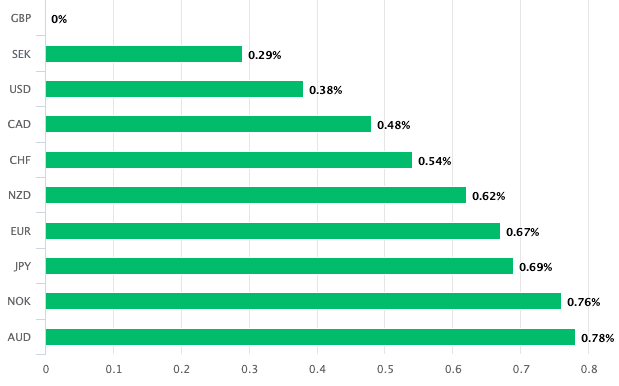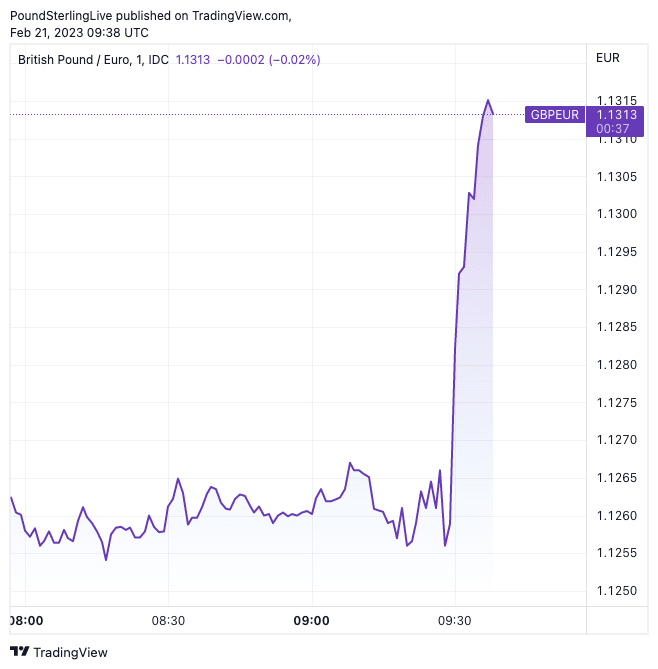Pound Sterling Jumps against Euro, Dollar as UK Economy Rebounds into Growth Territory: PMI Data
- Written by: Gary Howes

Image © Adobe Images
The UK economy will comfortably avoid a recession if the latest S&P Global PMI survey findings are anything to go by.
The British Pound jumped against the Euro, Dollar and other currencies after the UK Composite PMI rose to 53 in February, smashing expectations for a reading of 49.
This represents a significant step-up in activity on January's 48.5.
A reading below 50 signifies contraction, while a reading above signifies growth.
S&P Global said UK private sector firms signalled a solid rebound in business activity during February, which ended a sixmonth period of falling output.
The Manufacturing PMI delivered a solid rebound, coming in at 49.2, beating expectations for 47.5 and January's 47.
The Services PMI read at 53.3, surpassing expectations for 49.2 and January's 48.7.
The Pound to Euro exchange rate rose by more than half a percent in the windown following the release to 1.1314.
The Pound to Dollar exchange rate rose two-thirds of a percent in the same timeframe to 1.2073.
Above: GBP/EUR showing a clear reaction to the PMI release.
S&P Global said survey respondents cited rising customer demand and improving business confidence in February, due to lower economic uncertainty, fewer supply shortages and falling inflation.
Indeed, the February survey February pointed to the slowest overall increase in average cost burdens since April 2021.
Stronger customer demand contributed to renewed increases in backlogs of work and employment across the private sector economy during February.
The findings suggest the economic recession and rise in unemployment long forecast by the Bank of England, is still out of reach.
As such, expectations for an imminent end to the rate hiking cycle might be misplaced.
The prospect of a stronger economic outlook and higher interest rates, are supportive of the British Pound, which remains subject to ongoing negativity amongst financial analysts and market participants.
Compare Currency Exchange Rates
Find out how much you could save on your international transfer
Estimated saving compared to high street banks:
£2,500.00
Free • No obligation • Takes 2 minutes
"The sun broke through in February after six months of gloom with a swift and significant jump in output for private sector business. Supplier delivery times improved at the fastest rate since June 2009 for manufacturers as the marketplace showed signs of some recovery," says Dr John Glen, CIPS Chief Economist.
Input cost inflation eased for the third month running in February, with manufacturers recording a particularly marked slowdown in price pressures.
Lower purchase prices mostly reflected reduced fuel costs and falling shipping rates, some firms also noted fewer supplier surcharges linked to natural gas prices.
The picture is consistent with one of rapidly falling inflation rates in 2023.
Nevertheless, the Bank of England will take note of PMI findings that businesses say rising staff salaries have led to a sustained increase in the prices charged to consumers.
The Bank of England has said it remains alert to wage pressures as it seeks to bring inflation down by raising interest rates. Markets are currently expecting another 25 basis point hike in February, and then a potential pause.
"The resilience of the economy and the stickiness of the survey's inflation gauges add to the likelihood of the Bank of England tightening policy further, and potentially more aggressively," says Chris Williamson, Chief Business Economist at S&P Global Market Intelligence.

Above: GBP outperformance on Feb. 21.
Despite the positive headlines, one of the UK's most accurate economic forecasters says it is unlikely the UK has avoided recession.
Samuel Tombs, Chief UK Economist at Pantheon Macroeconomics, says it would be premature to conclude from the jump in the composite PMI to well above 50 in February that the economy has avoided a recession.
"The PMI is only a rough guide to activity and often is excessively influenced by sentiment. Right now, purchasing managers probably are relieved that the economic outlook is not quite as bad as seemed likely in Q4, given that interest rates expectations and wholesale energy prices have fallen since then, while equity prices have picked up," says Tombs.
Tombs has often ranked top in surveys of economic forecasters by both Bloomberg and Refinitiv.
Pantheon Economic says UK GDP will probably drop in both the first and second quarters as households' real disposable incomes continue to decline in response to further increases in consumer energy prices, and as households refinancing mortgages continue to cut back.
Compare Currency Exchange Rates
Find out how much you could save on your international transfer
Estimated saving compared to high street banks:
£2,500.00
Free • No obligation • Takes 2 minutes





